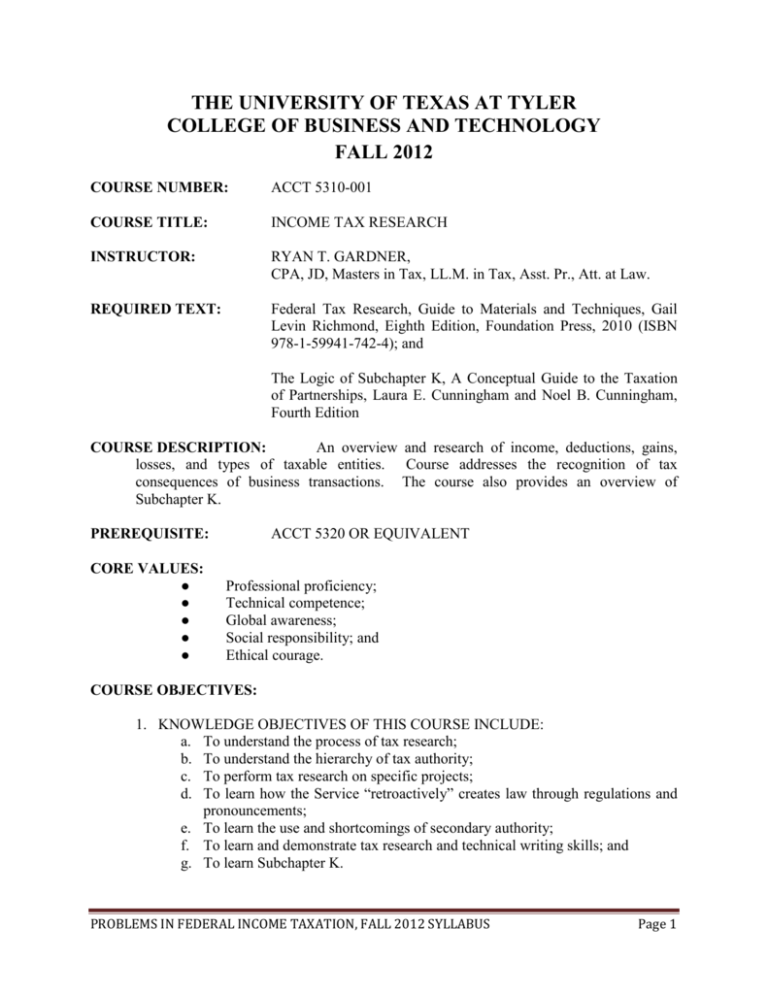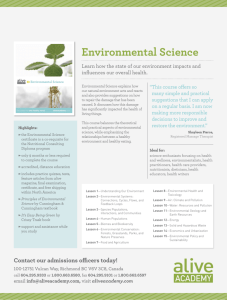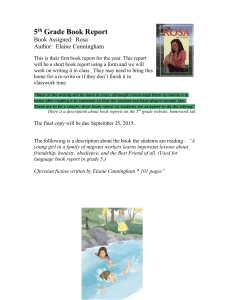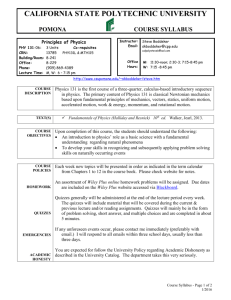the university of texas at tyler college of business and technology fall
advertisement

THE UNIVERSITY OF TEXAS AT TYLER COLLEGE OF BUSINESS AND TECHNOLOGY FALL 2012 COURSE NUMBER: ACCT 5310-001 COURSE TITLE: INCOME TAX RESEARCH INSTRUCTOR: RYAN T. GARDNER, CPA, JD, Masters in Tax, LL.M. in Tax, Asst. Pr., Att. at Law. REQUIRED TEXT: Federal Tax Research, Guide to Materials and Techniques, Gail Levin Richmond, Eighth Edition, Foundation Press, 2010 (ISBN 978-1-59941-742-4); and The Logic of Subchapter K, A Conceptual Guide to the Taxation of Partnerships, Laura E. Cunningham and Noel B. Cunningham, Fourth Edition COURSE DESCRIPTION: An overview and research of income, deductions, gains, losses, and types of taxable entities. Course addresses the recognition of tax consequences of business transactions. The course also provides an overview of Subchapter K. PREREQUISITE: CORE VALUES: ● ● ● ● ● ACCT 5320 OR EQUIVALENT Professional proficiency; Technical competence; Global awareness; Social responsibility; and Ethical courage. COURSE OBJECTIVES: 1. KNOWLEDGE OBJECTIVES OF THIS COURSE INCLUDE: a. To understand the process of tax research; b. To understand the hierarchy of tax authority; c. To perform tax research on specific projects; d. To learn how the Service “retroactively” creates law through regulations and pronouncements; e. To learn the use and shortcomings of secondary authority; f. To learn and demonstrate tax research and technical writing skills; and g. To learn Subchapter K. PROBLEMS IN FEDERAL INCOME TAXATION, FALL 2012 SYLLABUS Page 1 2. COMPETENCIES TO BE DEMONSTRATED IN THIS COURSE INCLUDE: a. Computer-based skills: i. Word processing: Preparing legal memorandum; ii. Internet search skills: Research federal and state tax authority; b. Communication skills: i. Written: 1. Report organization: Prepare legal memorandum appropriate format and analysis; 2. Referencing: Use of proper reference to tax authority; ii. Oral: Standing and communicating technical material to the class; in c. Interpersonal skills: Learn tax authority and usefulness of such authority to enable appropriate research and writing skills, as well as how to summarize the results of such research to the appropriate audience; d. Problem solving: i. Conceptual thinking: Utilize tax authority to analyze issues in taxation and provide advice on the outcome; ii. Gathering and analyzing data: Review pages of given facts to determine the relevant facts to solve legal issues; iii. Creativity and innovation: Learn proven ways to shortcut the research process and double and triple check your legal conclusion within a time frame that will provide value to future clients; e. Ethical issues in decision making and behaviors: Discuss certain ethical issues that arise in tax research and how your advice to your clients could result in Circular 230 violations; f. Personal accountability for achievement: i. Meeting deadlines: During the semester, you will perform: (A) twelve research assignments; (B) one client memorandum assignment; (C) a final exam; and (D) twelve pop quizzes. All projects must be completed on time. In general, no makeup work will be allowed; ii. Quality of work performed: The grades on the twelve research assignments will count for one-fourth of your grade. The client memorandum assignment will count for one-fourth of your grade. The final will count for one-fourth of your grade. Finally, the twelve pop quizzes will count one-fourth of your grade. Your ability to research will be crucial in the twelve research assignments. Your ability to research and summarize technical tax material will be crucial in the legal memorandum. Your final exam will primarily test the material learned in the book, in class and handout material. The twelve pop quizzes will test your knowledge of The Logic of Subchapter K. PROBLEMS IN FEDERAL INCOME TAXATION, FALL 2012 SYLLABUS Page 2 g. Competence in basic business principles: i. Competence in major field and grouping in other major core areas: There is broad coverage of tax authority and how and when to utilize such authority (described in more detail below), as well as some discussion of the audience, legal writing, understanding issues prior to launching into research, summarizing relevant facts and learning how to apply the facts to the law in a written document and verbal presentation; ii. Awareness of international as well as domestic implications of business decisions: Touch on topics relating to international taxation and difference in research process, and discuss why the tax system at times encourages offshore investment; iii. Understanding and appreciation of strategic impact of business decisions: Educate as to the importance of tax concerns in every business decision and how to effectively communicate complex authority to different audiences. 3. OUTCOMES FOR STUDENTS TO SUCCESSFULLY COMPLETE THIS COURSE INCLUDE: Mastery of the above objectives as demonstrated by satisfactory completion of: a. Twelve research assignments; b. One client memorandum; c. Final exam; and d. Twelve pop quizzes. CLASS MEETING: Tuesday, 6:00 p.m. to 8:40 p.m. CLASS ROOM: Braithwaite Building Room 01055 TEACHING METHOD: Lecture, review assignments and class discussion. OFFICE & PHONE NUMBER: EMAIL ADDRESS: HPR 220; 903-732-6268 (law office); 903-787-2889 (cell) If you want me, call or text my cell. If you want to come see me, set up an appointment with me at my law office: Ryan Gardner, Attorney at Law, PLLC 1121 ESE Loop 323, Suite 217 Tyler, Texas 75701 rgardner@uttyler.edu or rg@ryangardnerlaw.com If you want me, email my “law” email. I check it all the time. I check the UT Tyler email about two times a week. PROBLEMS IN FEDERAL INCOME TAXATION, FALL 2012 SYLLABUS Page 3 OFFICE HOURS: Tuesday and Thursday: 12:01 p.m. to 1:50 p.m. & 5:00 p.m. to 5:50 p.m.; or by appointment. Please see my cell number, law email address and law address if you want to contact me. I am always (except 9 p.m. to 7 a.m.) available to you, but sitting in an office waiting on people to show up will NOT be high on my priority list. TOPICS COVERED: 1. Internal Revenue Code 2. Treasury Regulations 3. IRS Rulings & Memor. 4. Case Law 5. Books/Articles/Online 6. Legislative History 7. Substantial Authority 6.25 hours 6.25 hours 6.25 hours 6.25 hours 6.25 hours 6.25 hours 2.5 hours READING ASSIGNMENTS AND COURSE SCHEDULE: The goal is for each student to read the chapter prior to class and understand the subject matter. Thereafter, the students will be performing research on topics covered in the reading material. The following is subject to change based on the Professor’s guidance. AUGUST: Tues. 21: Introduction & Syllabus Internal Revenue Code: Richmond, pp. 11 to 24; Cunningham, pp. 1 to 18 Tues. 28: Internal Revenue Code: Richmond, pp. 53-96 Assignment No. 1 due Cunningham, pp. 19 to 37 SEPTEMBER: Tues. 4: Treasury Regulations: Richmond, pp. 159-203 Assignment No. 2 due Cunningham, pp. 38 to 56 PROBLEMS IN FEDERAL INCOME TAXATION, FALL 2012 SYLLABUS Page 4 Tues. 11: Treasury Regulations: Read: Handouts Assignment No. 3 due Cunningham, pp. 57 to 75 Tues. 18: IRS Rulings, Memoranda, and Other Publications: Richmond, pp 203-244, 388-394 Assignment No. 4 due Cunningham, pp. 76 to 94 Tues. 25: IRS Rulings, Memoranda, and Other Publications: Assignment No. 5 due Cunningham, pp. 95 to 113 OCTOBER: Tues. 2: Case Law: Richmond, pp. 250-273, 395; Handouts Assignment No. 6 due Cunningham, pp. 114 to 132 Tues. 9: Case Law: Richmond, pp. 274-288 Bluebook and tax cite; Assignment No. 7 due Cunningham, pp. 133 to 151 Tues. 16: IRAC and Other Review Cunningham, pp. 152 to 170 Tues. 23: Professional Commentary – Books and Articles: Richmond, pp. 290-314; 316-337 Assignment No. 8 due Cunningham, pp. 171 to 189 Tues. 30: Professional Commentary – Online: Richmond, 362-387 Assignment No. 9 due Cunningham, pp. 190 to 208 PROBLEMS IN FEDERAL INCOME TAXATION, FALL 2012 SYLLABUS Page 5 NOVEMBER: Thurs. 1: Meet the Firms 4 to 6 p.m. Tues. 6: Legislative History: Richmond, pp. 96-131 Assignment No. 10 due Cunningham, pp. 209 to 227 Tues. 13: Legislative History: ISA Lang “Researching Tax Legislative History” Assignment No. 11 due Client Memorandum Handout Cunningham, pp. 228 to 246 Tues. 20: Substantial Authority: Richmond, pp. 6-10 Assignment No. 12 due Cunningham, pp. 247 to 260 Tues. 27: Catch up on material and go over draft client memorandum. DECEMBER: Tues. 4: Turn in Client Memorandum Review for Final Exam Tues. 11: FINAL EXAM 6:00 p.m. – 8:00 p.m. STUDENT EVALUATION: Your course grade will be based on twelve assignments, one client memorandum, one final exam and fourteen pop quizzes broken down as follows: 1. 2. 3. 4. Twelve Assignments (5 points each) Client Memorandum: Final Exam: Twelve Pop Quizzes (5 points each) Total Points Possible: 60 60 60 60 240 1. Twelve Assignments. It is proven fact that you cannot learn how to do tax research, without actually researching. Therefore, you will have twelve assignments throughout the course that will provide you the opportunity to learn, and I will grade them accordingly. Effort, thought and a strong attempt to find the answer will provide you with credit, whereas simply lucking into an answer will provide you little credit. I want to see your thought process, PROBLEMS IN FEDERAL INCOME TAXATION, FALL 2012 SYLLABUS Page 6 search techniques and how you obtained your answer. The answer is important, but the goal here is to teach the process, so use it to your advantage. 2. Client Memorandum: Where the twelve research assignments are driven at process and learning tax research, the client memorandum is driven at precise statement of: (a) relevant facts; (b) issue(s) presented; (c) rule(s) at issue; (d) application of the facts to the rules; and (e) conclusion. Please note the audience – a client memorandum. Preparing a file memorandum for a tax partner or to summarize your research is completely different than preparing a client memorandum to a business person. These differences will be discussed throughout the class. This memorandum is your opportunity to portray your research and writing skills into one document that will be a key for you in your employment. 3. Exam: The final exam will be twenty questions. Whether these questions will be multiple-choice or a question with space after each question for an answer is currently not known. These questions will require you to demonstrate knowledge and understanding of substantive law and terminology, as well as the ability to apply the law to or analyze specific fact situations. Make-up exam is very highly unlikely. 4. Pop Quizzes: The pop quizzes will test whether you read and understand the Subchapter K material from Cunningham and Cunningham. Unless you are dealing with publically traded entities, the vast majority of your work in the near future will be with partnerships. Every CPA and Attorney should have a working knowledge of all of Subchapter K and that is what you will receive by working through this book. The pop quizzes will more than likely take examples straight out of the book and change some numbers and be on the pop quizzes. We will probably have 14 pop quizzes and the top 12 grades from such quizzes will count towards your final grade in the class. 5. Other Policies: (a) Students Rights and Responsibilities. To know and understand the policies that affect your rights and responsibilities as a student at UT Tyler, please follow this link: http://www2.uttyler.edu/wellness/rightsresponsibilities.php. (b) Grade Replacement/Forgiveness and Census Date Policies. Students repeating a course for grade forgiveness (grade replacement) must file a Grade Replacement Contract with the Enrollment Services Center (ADM 230) on or before the Census Date of the semester in which the course will be repeated. Grade Replacement Contracts are available in the Enrollment Services Center or at http://www.uttyler.edu/registrar. Each semester’s Census Date can be found on the Contract itself, on the Academic Calendar, or in the information pamphlets published each semester by the Office of the Registrar. Failure to file a Grade Replacement Contract will result in both the original and repeated grade being used to calculate your overall grade point average. Undergraduates are eligible to exercise grade replacement for only three course repeats during their career at PROBLEMS IN FEDERAL INCOME TAXATION, FALL 2012 SYLLABUS Page 7 UT Tyler; graduates are eligible for two grade replacements. Full policy details are printed on each Grade Replacement Contract. The Census Date is the deadline for many forms and enrollment actions that students need to be aware of. These include: Submitting Grade Replacement Contracts, Transient Forms, requests to withhold directory information, approvals for taking courses as Audit, Pass/Fail or Credit/No Credit; Receiving 100% refunds for partial withdrawals. (There is no refund for these after the Census Date); Schedule adjustments (section changes, adding a new class, dropping without a “W” grade); Being reinstated or re-enrolled in classes after being dropped for nonpayment; and Completing the process for tuition exemptions or waivers through Financial Aid. (c) State-Mandated Course Drop Policy. Texas law prohibits a student who began college for the first time in Fall 2007 or thereafter from dropping more than six courses during their entire undergraduate career. This includes courses dropped at another 2-year or 4-year Texas public college or university. For purposes of this rule, a dropped course is any course that is dropped after the census date (See Academic Calendar for the specific date). Exceptions to the 6-drop rule may be found in the catalog. Petitions for exemptions must be submitted to the Enrollment Services Center and must be accompanied by documentation of the extenuating circumstance. Please contact the Enrollment Services Center if you have any questions. (d) Disability Services. In accordance with Section 504 of the Rehabilitation Act, Americans with Disabilities Act (ADA) and the ADA Amendments Act (ADAAA) the University offers accommodations to students with learning, physical and/or psychiatric disabilities. If you have a disability, including non-visible disabilities such as chronic diseases, learning disabilities, head injury, PTSD or ADHD, or you have a history of modifications or accommodations in a previous educational environment you are encouraged to contact the Student Accessibility and Resources office and schedule an interview with the Accessibility Case Manager/ADA Coordinator, Cynthia Lowery Staples. If you are unsure if the above criteria applies to you, but have questions or concerns please contact the SAR office. For more information or to set up an appointment please visit the SAR office located in the University Center, Room 3150 or call 903.566.7079. You may also send an email to cstaples@uttyler.edu. PROBLEMS IN FEDERAL INCOME TAXATION, FALL 2012 SYLLABUS Page 8 (e) Student Absence due to Religious Observance. Students who anticipate being absent from class due to a religious observance are requested to inform the instructor of such absences by the second class meeting of the semester. (f) Student Absence for University-Sponsored Events and Activities. If you intend to be absent for a university-sponsored event or activity, you (or the event sponsor) must notify the instructor at least two weeks prior to the date of the planned absence. At that time the instructor will set a date and time when make-up assignments will be completed. (g) Social Security and FERPA Statement. It is the policy of The University of Texas at Tyler to protect the confidential nature of social security numbers. The University has changed its computer programming so that all students have an identification number. The electronic transmission of grades (e.g., via e-mail) risks violation of the Family Educational Rights and Privacy Act; grades will not be transmitted electronically. (h) Emergency Exits and Evacuation. Everyone is required to exit the building when a fire alarm goes off. Follow your instructor’s directions regarding the appropriate exit. If you require assistance during an evacuation, inform your instructor in the first week of class. Do not re-enter the building unless given permission by University Police, Fire department, or Fire Prevention Services. (i) Course Disclaimer. This course is not intended to be comprehensive analysis of the laws and issues presented. The information contained in this course may not be applicable to all situations due to the generality of our discussions, the evolution of case law, and the necessity of interpretive guidance. For these reasons, nothing contained in this course should be relied upon without the benefit of legal and financial advice based on the particular circumstances presented. Furthermore, the policy of the State Bar of Texas prohibits the Instructor from providing legal advice to students. Students seeking individual legal advice are encouraged to contact their respective attorneys, or the State Bar of Texas Lawyer Referral Service (800-252-9690). (j) College of Business Statement of Ethics. The ethical problems facing local, national and global business communities are an ever-increasing challenge. It is essential the College of Business and Technology help students prepare for lives of personal integrity, responsible citizenship, and public service. In order to accomplish these goals, both students and faculty of the College of Business & Technology at The University of Texas at Tyler will: a. Ensure honesty in all behavior, never cheating or knowingly giving false information; b. Create an atmosphere of mutual respect for all students and faculty regardless of race, creed, gender, age or religion; c. Develop an environment conducive to learning; d. Encourage and support student organizations and activities; PROBLEMS IN FEDERAL INCOME TAXATION, FALL 2012 SYLLABUS Page 9 e. Protect property and personal information from theft, damage and misuse; and f. Conduct yourself in a professional manner both on and off campus. (k) Academic Dishonesty Statement. The faculty expects from its students a high level of responsibility and academic honesty. Because the value of an academic degree depends upon the absolute integrity of the work done by the student for that degree, it is imperative that a student demonstrates a high standard of individual honor in his or her scholastic work. Scholastic dishonesty includes, but is not limited to, statements, acts or omissions related to applications for enrollment of the award of a degree, and/or the submission, as one’s own work of material that is not one’s own. As a general rule, scholastic dishonesty involves one of the following acts: cheating, plagiarism, collusion and/or falsifying academic records. Students suspected of academic dishonesty are subject to disciplinary proceedings. University regulations require the instructor to report all suspected cases of academic dishonesty to the Dean of Students for disciplinary action. In the event disciplinary measures are imposed on the student, it becomes part of the students’ official school records. Also, please note that the handbook obligates you to report all observed cases of academic dishonesty to the instructor. PROBLEMS IN FEDERAL INCOME TAXATION, FALL 2012 SYLLABUS Page 10




